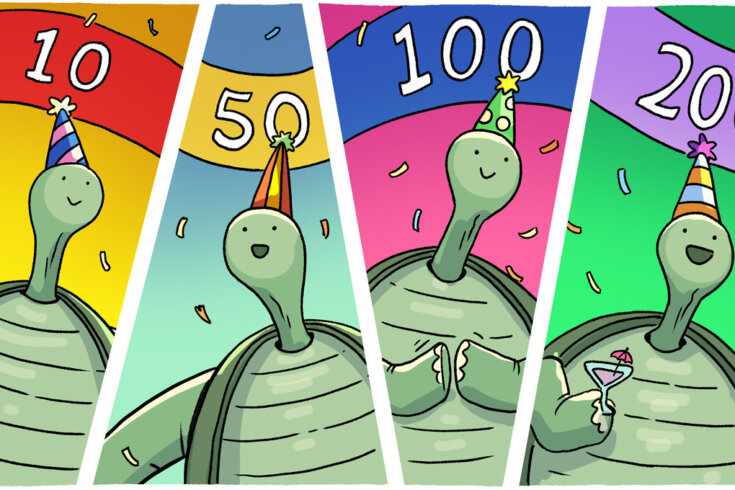
The average life expectancy of Canadians today is roughly eighty years. Turtles and tortoises can live far longer. Just last year, a tortoise named Jonathan, who holds the Guinness World Record for being the oldest ever chelonian, turned 190 years old.1 We asked Rita da Silva, a conservation demographer who conducted a study at the University of Southern Denmark on aging rates in turtles, what secrets these shelled seniors hold to living a long life.
How do turtles and tortoises age differently from humans?
We know that as humans get older, their bone density, mobility, and flexibility decrease, and the probability of dying increases. In the turtle populations I’ve studied—especially the ones that live in captivity—their mortality rate can actually decrease with age. Some researchers have even hypothesized that turtles and tortoises could live forever if they managed to avoid predators and disease.
What makes that possible?
There’s a theory that links anti-aging in certain species to their ability to continue growing their entire lives. That includes turtles, most fish, and plants. The same mechanism that allows them to grow also allows them to restore cells throughout their bodies. It has been hypothesized that for this reason, they can avoid aging and possibly even contracting age-related diseases. Humans, however, stop allocating energy to growing, and our cells become damaged over time, making us more susceptible to illnesses such as cancer and cardiovascular diseases.
How much does our environment affect how long we live?
In one study I worked on, we compared three species of turtle populations in captivity to ones in the wild. We found that the mortality rate does not increase with age for the captive populations, but it does for the wild populations. There are a few theories that might explain this. In captivity, turtles don’t have to spend energy avoiding predators. They don’t have to look for shelter or food, and the temperature is controlled. It’s a stable environment all around, and we suspect that these environmental conditions do play a role in how turtles age. Barring illness and injury, we don’t yet fully understand what eventually causes them to die.
A couple of years ago, two of the researchers I worked with on this project published another study that compared aging rates between humans and other primates. One of their conclusions was that when it comes to our species, our environment isn’t as significant. Over the past century, our life expectancy has been increasing because we have better access to health care and lower infant mortality rates, but we haven’t been able to drastically improve the rate at which we age.2
So what are humans’ prospects for living longer?
Some people hypothesize that we could, in theory, live forever if our conditions keep improving. Others think there’s a plateau—that no matter how good our conditions are, eventually, we will stop extending our life expectancy.
To determine which of these theories is true, researchers are also studying other species that are more closely related to humans, including other mammals and even birds.3 I do believe that if we can figure out why some are better at delaying aging by avoiding the effects of diseases such as cancer, and what makes these species eventually die, we, too, might find new ways to protect ourselves from those diseases.
1. It’s been suggested that Jonathan could be closer to 200 years old, as there’s no written record of his birth.
2. Life expectancy in the US actually decreased by one year between 2020 and 2021 due to COVID-19, according to the CDC.
3. Bowhead whales, which can resist many age-related diseases, have one of the longest life expectancies of all mammals. In 2015, researchers sequenced the animal’s genome, which could eventually help them learn how to reverse the effects of human aging.
As told to Alex Tesar. This interview has been edited for length and clarity.







